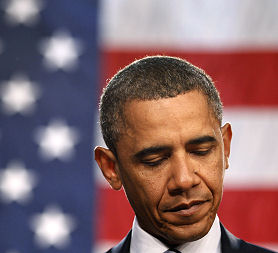Obama Middle East speech: a moment of opportunity
As Barack Obama prepares to deliver a major speech on US foreign policy in the Middle East, Channel 4 News US politics analyst Felicity Spector looks at his options.

It’s a moment of opportunity, as the White House put it – and one filled with uncertainty. As the sound of popular revolutions echoes across the Middle East, President Obama is seizing the chance to set out America’s new relationship and promote democratic change.
He will offer billions of dollars in aid to boost the political transitions in Egypt and Tunisia and, though this is no new Marshall Plan, to encourager les autres. There will be tough talk on Syria, Yemen and Bahrain and, perhaps, a sign of a newly coherent approach to the upheavals shaking the region.
The United States is now more unpopular in the Middle East than it was in 2009
And he will need to put some impetus into the stalled Israeli-Palestinian talks, admitting he has failed so far to push the peace process forward.
It is two years since Obama’s Cairo speech called for a “new beginning” with the Muslim world. Now, after the death of bin Laden and the revolutions which have swept some of the region’s longest serving leaders from power, the White House is promising something “sweeping” and “momentous”.
Syria
It is not expected to list a swathe of new proposals, more a restating of broader principles: how the United States now sees the Arab Spring in the context of its own interests and values.
The administration has already imposed new sanctions on Syria’s leader Bashar al-Assad and put pressure on the Yemeni leader to accept a deal involving his resignation within a month.
But there is still a swirl of criticism about America’s perceived inconsistency in dealing with the region’s autocratic regimes. For decades, its national interest has been synonymous with propping up dictatorships which offer the most long-term stability and security.
There is no word on whether Mr Obama will go further this afternoon and call on Assad to resign, and it is unlikely that he will, although one official said this week that the Syrian leader had a clear choice: “It’s either to lead this transition to democracy, or to leave.”
Israel
Perhaps the greatest attention, though, will be focused on what he has to say about the Arab-Israeli conflict. After talks with Jordan’s King Abdullah earlier this week, Mr Obama will be hosting Israel’s Prime Minister Binyamin Netanyahu tomorrow.
At stake is how far he will be willing to push Israel on the issue of Palestinian statehood and their willingness to make real territorial concessions. Crucially, Mr Netanyahu appears to have gone further than ever before over the West Bank, hinting that he would be willing to negotiate much of it away.
Although before anyone gets too optimistic, key stumbling blocks remain: Jerusalem, Jewish settlements and Israel’s refusal to accept Hamas as any part of a Palestinian administration.
Al Qaeda releases tape of bin Laden praising Arab uprisings
Al-Qaeda and other militant groups have waged bloody but unsuccessful campaigns to topple these same rulers across the Middle East. By praising the revolts, bin Laden, who was killed in a US raid on 2 May in Pakistan, appears to be trying to make the Islamists relevant again.
Then there is that new power-sharing deal between Hamas and Fatah, which is likely to complicate America’s response still further. Such is the state of uncertainty over what to say, with major differences of opinion between Hillary Clinton and National Security Adviser Thomas Donilon, that the Washington Post is reporting that “as recently as Tuesday, drafts of the speech were circulating with the Israeli-Palestinian section omitted”.
Apparently Obama likes to leave things to the last minute, although world peace isn’t really a last-minute kind of thing.
As for that “new beginning” which the President hailed in Cairo two years ago, there is certainly no shortage of new beginnings, across the Arab world now.
Yet if the latest polls are anything to go by, America has signally failed to profit from the new world (dis)order. Pew Research has found that the United States is now more unpopular in the Middle East than it was in 2009. From the cradle of the revolution in Egypt, to Jordan and even Turkey, US approval ratings are all substantially down.
Obama’s second chance
His administration has been criticised for being too slow to respond to the whirlwind of changes. Now, his image recast by the killing of Osama bin Laden, President Obama has another chance not just to interpret the world but to help transform it.
Today’s speech will be simultaneously translated into Farsi, Arabic and Hebrew. It is being live streamed over the internet and straight afterwards the White House is hosting a live chat on Twitter with the Deputy National Security advisor Ben Rhodes, where anyone can put questions and post their reactions.
In a region where understanding is in such scarce supply, the Obama administration is seeking all the dialogue it can get.
